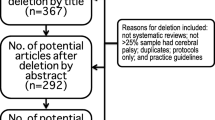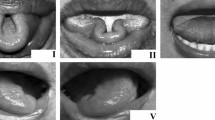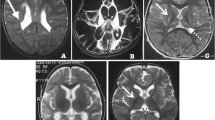Abstract
Thirty-five children with cerebral palsy and moderate eating impairment were studied to determine the effect of oral sensorimotor treatment (OST) on eating efficiency and measures of growth (weight gain). After taking effects of maturation into account, 11 children who received OST (group A) exceeded their expected centile line by 1.7 percentile points after 10 weeks of treatment. Chewing exercises alone (group B) had no effect on weight gain. Although small decreases occurred in the time needed to eat three standard textures of food (solid, viscous, puree) in groups A and B, these were not significant. Children maintained their weight-for-age percentile line although at the lower end of expected norms. These children will be at risk of growth failure because of the increased energy demands once they enter their teenage growth spurt. The clinical implications of these findings are that prolonged mealtime and oralmotor therapies may be adequate through the childhood years. Thereafter, children's growth must be monitored carefully, and oral caloric supplementation is suggested to provide the necessary energy for growth.
Similar content being viewed by others
References
Reilly S, Skuse D: Characteristics and management of feeding problems of young children with cerebral palsy. Dev Med Child Neurol 34:379–388, 1992
Thomessen M, Heiberg A, Kase BF, Larsen S, Riis G: Feeding problems, height and weight in different groups of disabled children. Act Paediatr Scand 80:527–533, 1991
Thomessen M, Kase BF, Riis G, Heiberg A: The impact of feeding problems on growth and energy intake in children with cerebral palsy. Eur J Clin Health 45:479–487, 1991
Edebol-Tysk K: Evaluation of care-load for individuals with spastic tetraplagia. Dev Med Child Neurol 31:737–745, 1989
Gisel EG, Patrick J: Identification of children with cerebral palsy, unable to maintain a normal nutritional state. Lancet I:283–286, 1988
Campbell PH: Assessing oral-motor skills in severely handicapped persons: an analysis of normal and abnormal patterns of movement. In: York R, Edgar E (eds.): Teaching the Severely Handicapped. Seattle, WA: Association for the Severely Handicapped, 1979, pp 39–63
Stallings VA, Charney EB, Davies JC, Cronk CE: Nutritionrelated growth failure of childeren with quadriplegic cerebral palsy. Dev Med Child Neurol 35:126–138, 1993
Patrick J, Gisel EG: Nutrition for the feeding-impaired child. J Neurol Rehabil 4:115–119, 1990
Patrick J, Boland M, Stoski D, Murray GE: Rapid correction of wasting in children with cerebral palsy. Dev Med Child Neurol 28:734–739, 1986
Krick J, Van Duyn MS: The relationship between oral-motor involvement and growth: a pilot study in a pediatric population with cerebral palsy. J Am Diet Assoc 84:555–559, 1984
Johnson CB, Deitz JC: Time use of mothers with pre-school children: a pilot study. Am J Occup Ther 39:578–583, 1985
Alphonce-Schweizer E: Oral-motor skills and physical growth of normal children and children with cerebral palsy. PhD thesis, McGill University
Martin HP: Nutrition: its relationship to children's physical, mental and emotional development. Am J Clin Nutr 26:766–775, 1973
Galler JR, Ramsey F, solimano G: The influence of early malnutrition on subsequent behavioral development. III. Learing disabilities as a sequel to malnutrition. Pediatr Res 18:309–313, 1984
Galler JR, Ramsey F, Solimano G, Kucharski LT, Harrison R: The influence of early malnutrition on subsequent behavioral development. IV. Soft neurologic signs. Pediatr Res 18:826–832, 1984
Galler JR, Ramsey F, Solimano G: A follow-up study of the effects of early malnutrition on subsequent development. II. Fine motor skills in adolescence. Pediatr Res 19:524–527, 1985
Ottenbacher K, Hicks J, Roark A, Swinea J: Oral-sensorimotor therapy in the developmentally disabled: a multiple baseline study. Am J Occup Ther 37:541–547, 1983
Ottenbacher K, Scoggins A, Wayland J: The effectiveness of oral sensory-motor therapy with the severely and profoundly developmentally disabled. Occup Ther J Res 1:147–160, 1981
Sobsey R, Orelove FP: Neurophysiological facilitation of eating skills in children with severe handicaps. J Assoc Sev Hand 9:98–110, 1984
Korabek CA, Reid DH, Ivancic MT: Improving needed food intake of profoundly handicapped children through effective supervision of institutional staff. Appl Res Ment Ret 2:69–88, 1981
Riordan MM, Iwata BA, Wohl MK, Finney JW: Behavioral treatment of food refusal and selectivity in developmentally disabled children. Appl Res Ment Ret 1:95–112, 1980
Riordan MM, Iwata BA, Finney JW, Wohl MK, Stanley AE: Behavioral assessment and treatment of chronic food refiusal in handicapped children. J Appl Behav Anal 17:327–341, 1984
Rempel GR, Colwell SO, Nelson RP: Growth in children with cerebral palsy fed via gastrostomy. Pediatrics 82:857–862, 1988
Sanders KD, Cox K, Cannon R, Blanchard D, Pitcher J, Papathakis P, Varella L, Maughan R: Growth response to enteral feeding by children with cerebral palsy. J Parent Ent Nutr 14:23–26, 1990
Gisel EG: Chewing cycles in 2 to 8-year-old normal children: a developmental profile. Am J Occup Ther 42:40–46, (1988)
Gisel EG: Effect of food texture on the development of chewing of children between 6 months and 2 years of age. Dev Med Child Neurol 33:69–79, 1991
Tcheremenska AR, Gisel EG: Use of substitute food textures for standard eating assessment in children with cerebral palsy and children without disabilities. Am J Occup Ther 48:626–632, 1994
Gisel EG: Effect of oral sensorimotor treatment on measures of growth and efficiency of eating in the moderately eating-impaired child with Cerebral Palsy. Dysphagia 11:48–58, 1996
Kenny DJ, Koheil RM, Greenberg J, Reid D, Milner M, Moran R, Judd PL: Development of a multidisciplinary feeding profile for children who are dependent feeders. Dysphagia 4:16–28, 1989
Parrot LC, Selley WG, Brooks WA, Lethbridge PC, Cole JJ, Flack FC, Ellis RE, Tripp JH: Dysphagia in cerebral pasly: a comparative study of the Exeter dysphagia assessment technique and a multidisciplinary assessment, Dysphagia 7:209–219, 1992
Gisel EG, Applegate-Ferrante T, Dorst J, Benson J, Bosma JF: Oral-motor skills following sensorimotor therapy in two groups of moderately dysphagic children with cerebral palsy: aspiration vs non-aspiration. Dysphagia 11:59–71, 1996
Krick J, Murphy PE, Markham JFB, Shaprio BK: A proposed formula for calculating energy needs of children with cerebral palsy. Dev Med Child Neurol 34:481–487, 1992
McGrath SJ, Splaingard ML, Alba HM, Kaufman BH, Glicklick M: Survival and functional outcome of children with severe cerebral palsy following gastrotomy. Arch Phys Med Rehabil 3:133–137, 1992
Stolovitz P, Gisel EG: Circumoral movements in response to three different food textures in children 6 months to 2 years of age. Dysphagia 6:17–25, 1991
Bosma JF: Development and impaiments of feeding in infancy and childhood. In: Groher M (ed.): Dysphagia: Diagnosis and Management, 2nd ed. Stoneham, MA: Butterworth-Heinemann, 1992, pp 107–141
Mathisen B, Skuse D, Wolke D, Reilly S: Oral-motor dysfunction and failure to thrive among inner-city infants. Dev Med Child Neurol 31:293–302, 1989
Griggs CA, Jones PM, Lee RE: Videofluoroscopic investigation of feeding disorders of children with multiple handicaps. Dev Med Child Neurol 31:303–308, 1989
Evans PM, Evans SJW, Alberman E: Cerebral palsy: why we must plan for survival. Arch Dis Child 65:1329–1333, 1990
Gisel EG, Alphonce E: Classification of eating impairments based on eating efficiency in children with cerebral palsy. Dysphagia 10:268–274, 1995
Author information
Authors and Affiliations
Rights and permissions
About this article
Cite this article
Gisel, E.G. Effect of oral sensorimotor treatment on measures of growth and efficiency of eating in the moderately eating-impaired child with cerebral palsy. Dysphagia 11, 48–58 (1996). https://doi.org/10.1007/BF00385800
Issue Date:
DOI: https://doi.org/10.1007/BF00385800




